How to create a business directory website without becoming a web developer yourself? The best way is to use directory website builder software. As the name suggests, business directory builders allow almost any user to quickly create modern business directories. I have compiled a list of the 7 best directory website builders and discussed their advantages and disadvantages. This will save you time and unnecessary expenses.
Website or business directories have been around almost since the dawn of the internet. There has always been a need to compile lists of businesses, companies, and websites with relevant contact information. This tradition dates back to the pre-internet era when company directories existed in physical form. You might recall those large, colorful books your father would regularly consult for information.
With the advent of the internet, the task of locating websites and businesses shifted to online directories. If these directories were dedicated to businesses, they are known as business directories. If they were devoted to websites, they are commonly referred to as web directories.
In recent times, there has been a resurgence of interest in directories. The primary reason is that search engines have become exceptionally discerning – almost too discerning. Their artificial intelligence systems either can’t provide (or won’t provide?) a comprehensive list of businesses or companies based on specific criteria, or the lists they do offer are too restricted.
Don’t believe it? Try instructing ChatGPT to provide you with a list of 100 legal firms in Los Angeles specializing in divorce proceedings. Was it successful? Exactly. That’s why people tend to resort to pre-compiled lists of companies in directories.
Directories are curated by real people, and although some information may become outdated over time, their value is evident. They provide a rich source of information that often exceeds what is readily available through search engines.
What is a Directory?
A directory, in the context of the internet, is a specialized platform that lists and categorizes information about businesses, individuals, websites, or any specific niche information. These directories typically include data such as business names, addresses, contact information, services provided, and even user reviews. In essence, a directory is a digital library that is organized for easy access and retrieval of information.
Purpose and Benefits of Directories for a Businesses
In a business context, directories can provide substantial value. They offer businesses increased visibility, thereby boosting brand recognition and reputation. Directories can improve local SEO and contribute to improved search engine rankings, resulting in higher web traffic and potential sales. Furthermore, directories serve as a platform for customer reviews, facilitating trust and credibility for businesses listed.
Top 7 Directory Website Builders
Now let’s delve into the seven most effective solutions for creating a contemporary directory. I’ve endeavored to pinpoint the main advantage and possible drawback of each. In this way, you can discern whether or not this directory software is right for you.
Brilliant Directories
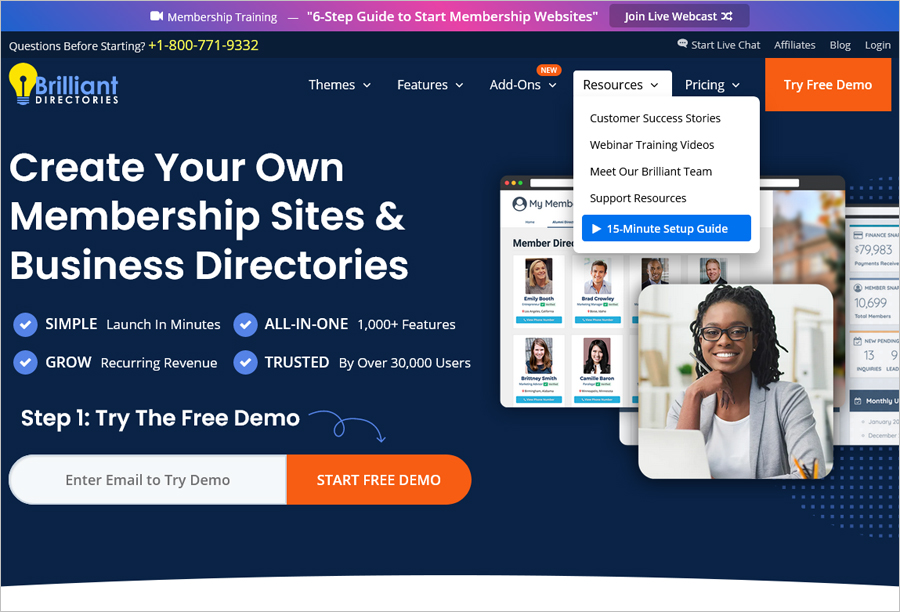
Brilliant Directories stands as a premier directory website builder because of its impressive range of features. It’s an all-in-one directory platform that includes email marketing tools, payment processing, customizable membership plans, lead generation tools, and more. This makes it perfect for organizations looking to build a comprehensive directory website without the need for additional plugins or software.
One key advantage of Brilliant Directories is its flexibility. With over 100 integrations, businesses can connect their directory to a vast array of third-party applications to enhance their directory’s functionality. It also offers a wide range of themes and design options, allowing businesses to create a website that reflects their brand’s aesthetics. Plus, its website templates are fully responsive, meaning they’re designed to look good on all devices, whether desktop or mobile.
On the other hand, the extensive range of features offered by Brilliant Directories can be overwhelming for beginners. The learning curve may be steeper than some other platforms, and while the platform does provide customer support, response times can sometimes be longer than expected. Its pricing might also be a bit high for smaller businesses or startups on a tight budget.
Appy Pie

Appy Pie is a no-code platform that makes it easy for anyone to build a directory website. The drag-and-drop interface allows users to create a website without any coding knowledge, which is perfect for beginners. It also stands out because of its versatility, as it allows you to create mobile apps in addition to directory websites. This dual functionality can be a significant advantage for businesses looking to reach mobile users.
Appy Pie’s simplicity extends to its design options. It offers a variety of templates that you can use as a starting point for your directory website. From there, you can customize your site’s look and feel by changing colors, fonts, and images. Appy Pie also includes SEO tools to help your site rank better in search engine results.
However, while the platform’s simplicity is a strength for beginners, it may be a disadvantage for advanced users who desire more control over their site’s design and functionality. Additionally, although Appy Pie offers a free version, this comes with significant limitations. To access all features and remove Appy Pie branding from your site, you’ll need to upgrade to one of their paid plans.
Directorist
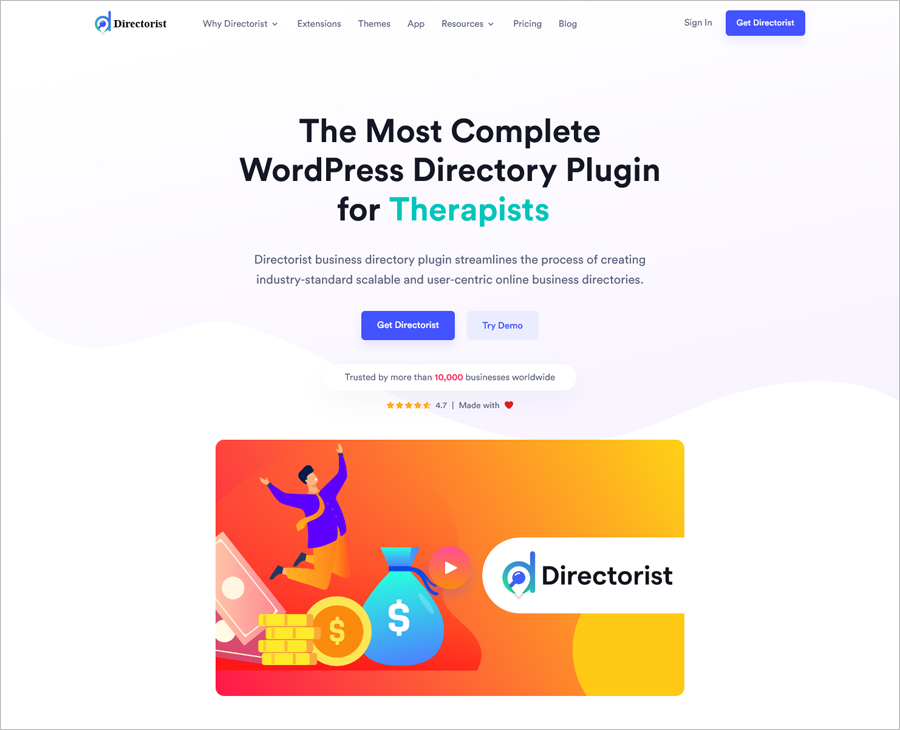
Directorist is a powerful directory plugin for WordPress, the world’s most popular website builder. This makes it an excellent choice for businesses that already have a WordPress site and want to add directory functionality. Directorist is designed to be highly customizable, with numerous options to adjust the look and feel of your directory.
One of the biggest advantages of Directorist is that it leverages the power of WordPress. This means you can extend your directory’s functionality using any of the thousands of plugins available for WordPress. Directorist also allows you to monetize your directory through paid listings, ads, and claimable listings.
Despite its many advantages, Directorist is not without its drawbacks. Because it’s a WordPress plugin, you must have a WordPress site to use Directorist. This means if you’re not already familiar with WordPress, you may have a steeper learning curve. Furthermore, while Directorist is feature-rich, its support service might not be as dedicated as those seen in standalone directory builders.
360Directories
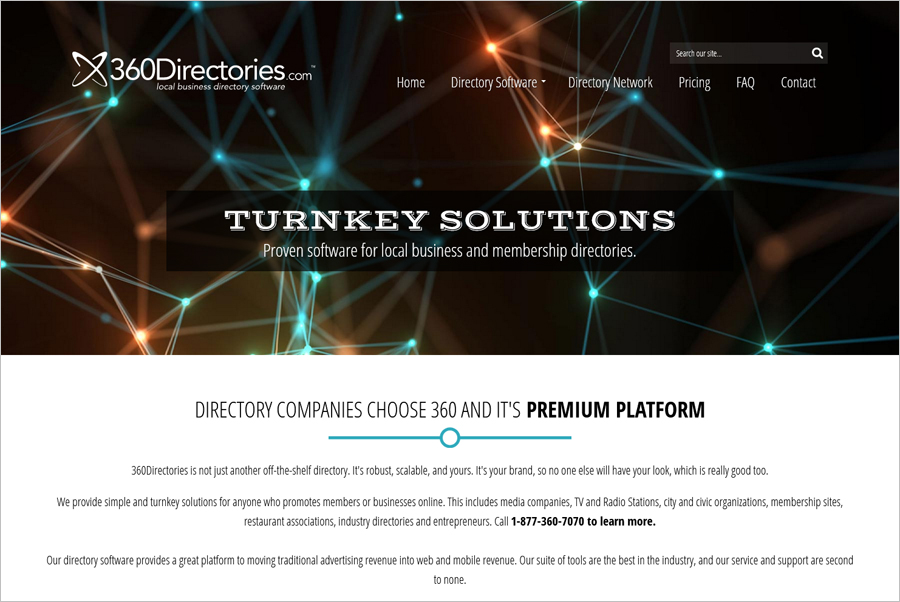
360Directories is a comprehensive directory software known for its robust features and user-friendly design. With it, businesses can create directory websites complete with interactive maps, search functionality, and various listing options. These features make it easy for site visitors to find the information they need.
One notable feature of 360Directories is its ability to create community-based directories. These can be excellent for city or town directories, industry directories, or any other group where members want to share information. Moreover, 360Directories also offers social media integration, allowing businesses to share their listings across different social platforms.
However, a potential downside of 360Directories is its slightly outdated interface. This could affect the user experience and make the site feel less modern. Furthermore, compared to other options, 360Directories might be a bit pricey, especially for small businesses or startups with a tight budget.
GoClixy
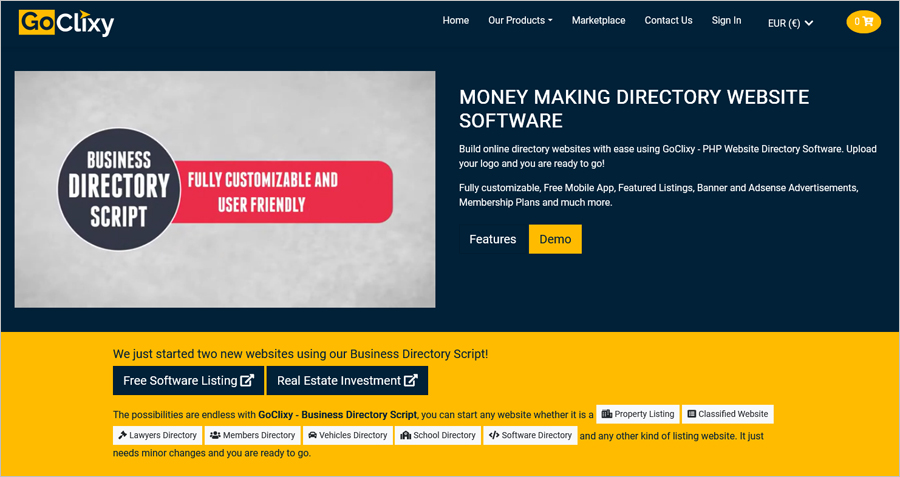
GoClixy provides a directory and business listing software with built-in SEO tools, multiple payment gateways, and multilingual support. It’s designed to be user-friendly, even for those with limited technical knowledge, making it a good option for business owners who want to create a directory website without hiring a developer.
One of the standout features of GoClixy is its SEO-friendly design. All pages on a GoClixy directory website are optimized to rank well in search engine results, helping to increase visibility and drive traffic to your site. Additionally, GoClixy supports multiple payment gateways, making it easy for businesses to monetize their directory.
On the downside, while GoClixy is designed to be user-friendly, some technical knowledge is required to get the most out of the software. For example, you may need to understand basic HTML or CSS to customize your site fully. Additionally, while GoClixy offers a free version of its software, this is significantly limited compared to the paid version.
MarketGrabber
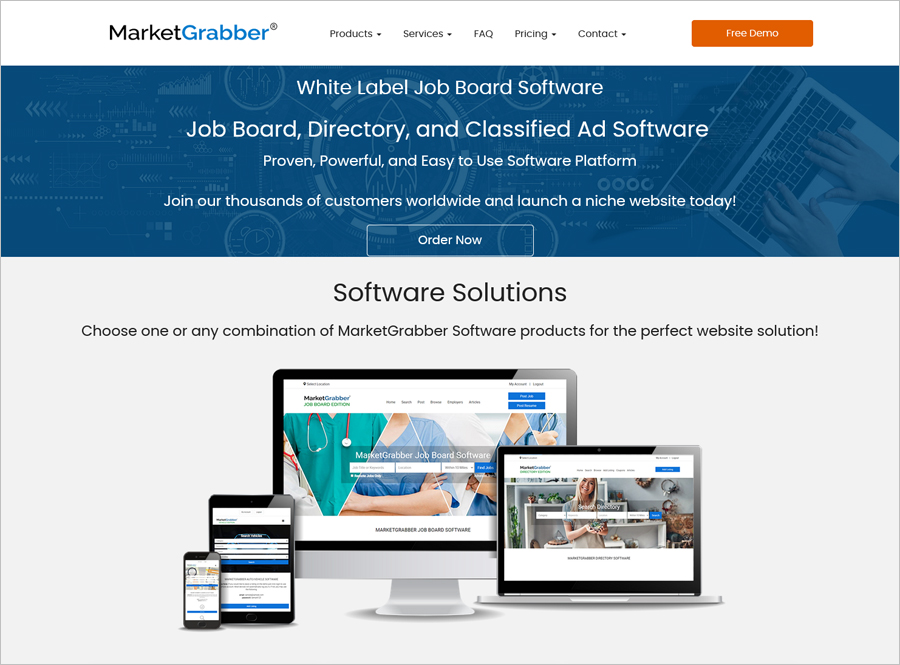
MarketGrabber offers a range of industry-specific directory software solutions. This means that it’s not a one-size-fits-all directory builder. Instead, you can choose a version of MarketGrabber that’s tailored to your specific industry. Whether you’re looking to create a job board, a real estate directory, or a classifieds site, there’s a MarketGrabber solution for you.
One of the primary advantages of MarketGrabber is this industry-specific focus. Because each version of the software is designed with a specific industry in mind, you get features and tools that are relevant to your needs. Moreover, MarketGrabber also includes SEO tools to help your site rank well in search engine results, and it supports multiple payment gateways for monetizing your site.
However, MarketGrabber’s narrow focus can be a disadvantage if you’re looking to create a more general directory. Furthermore, because it’s industry-specific, MarketGrabber’s pricing is a bit higher than some other directory builders. If you’re on a tight budget, this could be a significant drawback.
VEVS
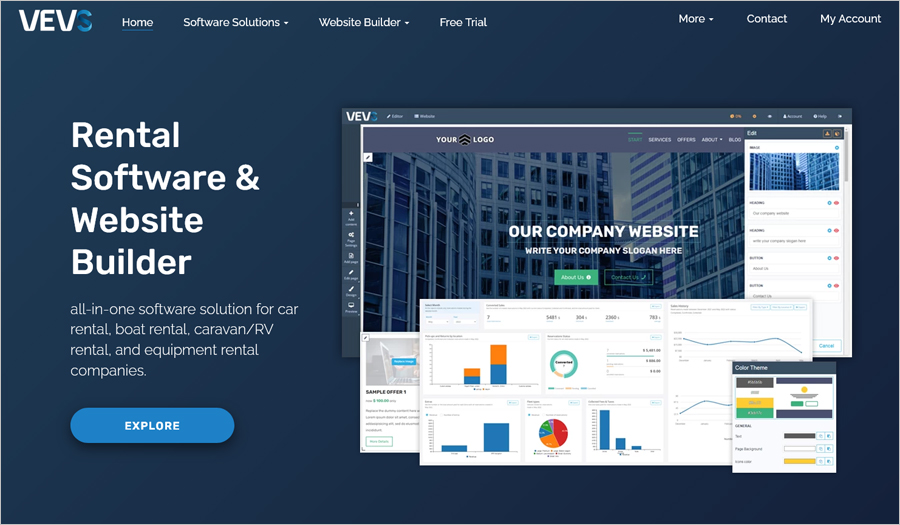
VEVS stands out for its range of website solutions, including a directory and listing software. With VEVS, you can create detailed listings complete with descriptions, images, and interactive maps. This can be particularly useful for businesses that want to provide as much information as possible about each listing.
A unique feature of VEVS is its interactive maps. These allow users to see exactly where each listing is located, which can be incredibly useful for directories of physical locations. Moreover, VEVS offers a variety of templates, so you can choose a design that matches your brand’s aesthetics.
Despite its advantages, VEVS might not be as feature-rich as some of the other options on this list. For example, it lacks some advanced features like community tools or a dedicated mobile app. Furthermore, VEVS is one of the pricier options on this list, which might put it out of reach for some small businesses or startups.
How to Choose the Best Platform for a Business Directory
Choosing the best platform for a business directory website can be a daunting task, given the wide array of available options. However, by considering certain key factors, you can make an informed decision that aligns with your business needs.
Understand Your Requirements – Before you start looking at different directory website builders, it’s crucial to understand your business needs and objectives. Do you need a simple directory, or do you require advanced features like ecommerce integration, payment processing, or email marketing? Knowing your requirements will help narrow down the list of suitable directory website builders.
Ease of Use – Consider the level of technical expertise required to use the platform. If you’re a beginner or non-tech savvy, look for a website builder with an intuitive interface, preferably a drag-and-drop editor.
Customization Options – Ensure the platform provides enough customization options to match your brand identity. Check if you can change colors, fonts, layouts, and add your logo without much hassle.
Pricing – Price is an important factor for most businesses. Ensure that the platform you choose offers good value for the price. Remember, cheap is not always the best, so look for a platform that balances features and pricing.
Scalability – Your directory website might grow over time, so choose a platform that can handle this growth. The platform should be able to accommodate more listings, higher traffic, and additional features as your business expands.
Support and Resources – The platform should provide strong customer support and abundant resources like guides, tutorials, and forums to help you get started and address any issues you may encounter.
SEO Capabilities – A good directory website builder should have built-in SEO tools to help your website rank higher in search engine results. This is important for driving traffic to your site.
Mobile Responsiveness – In this mobile-first era, make sure the website builder creates sites that are responsive and look good on all devices, from desktops to smartphones.
Integration and Plugins – Lastly, look at the available integrations and plugins that can extend the functionality of your website. This could include social media integrations, payment gateways, email marketing tools, and more.
By taking into account these factors, you can ensure that you choose the best directory website builder that meets your business’s specific needs and goals. Remember, what works best for one business might not work for another, so take the time to research and test various options before making a decision.
Remember, creating a successful business directory is not just about selecting the best directory website builder; it’s about understanding your audience, delivering valuable content, and continuously improving based on feedback and performance metrics. With careful planning and execution, your directory website can become a valuable resource for your audience and a powerful tool for your business.







Andy
Thank you for providing an extensive list of directory software. I observed one point of note – you suggest that ChatGPT may not be the optimal choice for business searches, recommending the use of a local directory website instead. That is true and I agree with that, however, I would like to emphasize that ChatGPT remains a valuable option for business directories offering the potential for integration into directory websites. It can assist listing owners in generating compelling business descriptions or can automatically generate inquiries based on visitor input, similar to the functionality found in the phpListings directory software.